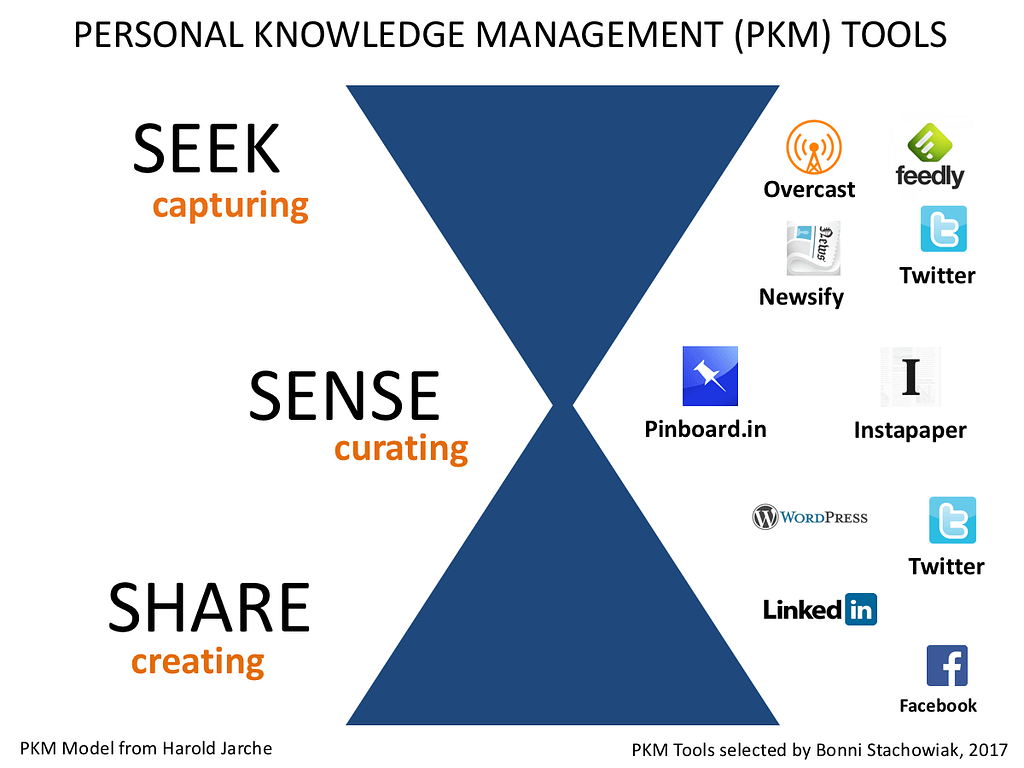This Saturday, I begin a doctoral class that I teach a couple of times each year. One of the topics we explore is personal knowledge management (PKM).
Over the eight weeks we'll learn together, the doctoral students will create and refine their own PKM processes. They will then be able to regularly seek out new knowledge, make sense of that knowledge, and then share their own perspectives on it in community.
As I prepare for the course to start, I realize that some of my own PKM system has changed, since I first started teaching the course back in 2014. This post provides a current description of my approach and tools and hopefully gives anyone reading this post some inspiration for getting started with your own PKM system.
Personal Knowledge Management Defined
Instead of being at the mercy of all the information that flies at us on a given day, we can take charge of the process, and discover ways to seek our credible and relevant information, transform it into knowledge (information that serves a purpose), and share it with others in our networked communities. Harold Jarche defines PKM as:
… a set of processes, individually constructed, to help each of us make sense of our world and work more effectively.”
This graphic illustrates the tools that work in concert to make my PKM system efficient and effective.

Seek
Kris Shaffer emphasizes the need to combat misinformation in Truthy Lies and Surreal Truths: A Plea for Critical Digital Literacies. Where we go looking for information will certainly impact whether what we find is trustworthy and also if it is connected with our individual learning pursuits.
I try to keep the tools I use for seeking to a bare minimum (primarily Twitter, Feedly, and my podcast client – Overcast). I also regularly consider whether the people and sources I follow are worthy of my attention. To avoid being a information hoarder, I design a system that feeds me regularly and keeps me in a continual state of learning.
Twitter (Microblogging service)
Twitter is the most timely of my seek tools. My list for getting started on twitter for education doctoral students provides a small list of possibilities. Generally speaking, I advise following more individuals than you do organizations (there are exceptions to that guidance). Twitter is about relationship, for me. Peter Newbury also gave my Teaching in Higher Ed podcast listeners such good advice when he advocated that we follow people who are like us, and follow people who are not like us on Twitter.
Feedly (RSS reader)
Feedly connects me with articles, blogs, and other information from all sorts of areas of interest. Whether Seth Godin is filling my mind with wisdom, or I'm finding out about the latest geeky Apple news from Daring Fireball, I can be assured that valuable information is at the ready, each time I visit.
There's an option to mark-all-as-read on Feedly, too, which I can't recommend highly enough. Being able to press the reset buttons on our PKM systems is a vital option to keep in mind. We'll never be able to “keep up” with everything that is going on in our various social networks, but we can “tap in” when we're ready to engage.
Overcast (Podcast app)
Probably the easiest component for me to get behind in with my PKM system is with podcasting. There are so many phenomenal podcasts out there and not enough hours in the day to enjoy each of them. Malcolm Gladwell is doing some innovative storytelling with his Revisionist History podcast. Mike Wesch gives a tremendous look into college students' lives in the first episode of his Life101 podcast. This American Life tells stories about what happens when school kids from two very different contexts come together.
Sense
When people are first introduced to PKM, they usually get super energized and excited by the seek part. It's like getting to eat at a magnificent information buffet, with so many options to choose from… It's the sense part that is harder to digest.
Information in isolation does us no good. We must, instead, make sense of what we are taking in…
Social Bookmarking
We can use social bookmarking tools to keep our information categorized (through tagging) and make it easier to draw from it in the future.
I use a bookmarking service called Pinboard.in. As I view my tags, I can see which ones have the most bookmarks within them, because they show up as larger in my tag cloud. My three most popular tags are:
- EDD703 (relevant information for the class I've been referring to in this post)
- EdTech (lots of duplicates from EDD703 and EdTech, since they both address similar topics)
- HigherEd (the industry I work in)
Share
This is the part of the process that often makes people the most nervous. There's a feeling of inadequacy that arises. What we share doesn't have to be an original creation. In fact, it is often through networked learning that we are able to discover places we might not have ventured on our own…
Curation
One way we can provide value to our networks is through curation. Curators are becoming increasingly popular in our knowledge-hungry society. This video talks about the benefits of curation and presents some popular curators from different disciplines.
We can also recognize the value of “working out loud.” As we document our failures, we're not the only ones who get to learn from those mistakes.
Original Content
I share original content weekly through releasing a podcast episode, a blog post, and tweeting out links to content I've created, as well as curated.
Scheduled Sharing
I use a service called Buffer that lets me tweet on whatever schedule best serves my network's needs, instead of whenever I happen to be in front of a computer.
Getting Started
While this post articulates my PKM system in its entirety, I suggest you don't try to follow it like it was a recipe. Instead, just dive in and start setting up a system to help you seek, sense, and share.
Find 4-5 people to follow on Twitter and start checking in on what they have to say daily. Set up a bookmarking service (EDD 703 students will be using Diigo, so we can share our bookmarks, together). And start retweeting some of the great things you read about on Twitter, with a few words of why you found what they had to say so important.
For more information on setting up a PKM, check out my Introduction to Personal Knowledge Management module.




